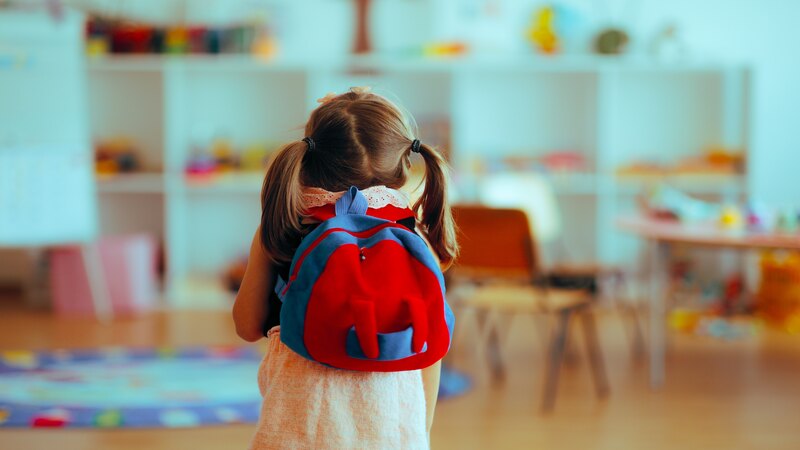
Preschool is a place where little budding toddlers can bloom to their full potential before they enter the actual school. Kindergarten and Montessori playhouses are the most famous two versions of preschools proposed by famous educators Friedrich Fröbel and Maria Montessori respectively. While the importance of such preschools is undeniable nowadays, the real debate occurs on the perfect age for toddlers to enter there. Even parents who believe preschool education is important for their toddler’s holistic development, often consider delaying preschool entry.
Therefore, the question arises what is the suitable age for preschool entry for toddlers? Does delaying preschool entry help toddlers or cause severe disadvantages in their later academic and socio-emotional development? Why do parents consider delaying preschool entry for their toddlers? Here you will get your answers.
At What Age Should Your Toddler Start Preschool?

Previously a toddler can enter a preschool anytime between 3 to 6 years, or you can say anytime before starting formal education. However, the recent National Education Policy or NEP2020 lays stress on the preschool education of toddlers by making it mandatory to begin pre-primary education from age 3 (1). However, most preschools nowadays allow toddlers as soon as they are 2-years-old. Therefore, you can let your toddler go to preschool immediately after they turn 2 or delay the entry till 3 years, following the guidelines of NEP.
Why is Preschool Important?

Every toddler is different and they deserve a great start to their learning experience. Preschool is their first stepping stone to knowing the outward world outside of their homes. Preschools lay the foundation of their social, emotional, physical, and linguistic development as here they get to be involved in play way learning while interacting with their peers and education (2).
How to Know if Your Toddler is Ready For Preschool?

Due to the massive developmental benefits, you need to enroll your toddler in the preschool as soon as you can see their readiness rather than waiting for too long. A few signs to identify preschool readiness in your toddler are (3):
- Shows signs of independence
- Getting attracted to the outside world
- Trying to listen and reply to you
- Remembering some rhymes, alphabets and numbers that you teach playfully at home
- Trying to visit the bathroom on their own
Why do Parents Delay Preschool Entry?

Parents, however, often consider delaying the preschool entry of their toddlers even if they hit the age bar or show the above readiness. They often ignore the fact that this initial delay can result in their kid’s poor academic performance in later years (4). Below are a few common reasons why parents or caregivers delay the preschool entry of their toddlers:
- Maturity: Some regard maturity as the development of social, cognitive and physical ability which comes automatically with time. Therefore they prefer waiting till their kid becomes mature
- Learning Abilities: Some parents underestimate their kid’s ability to learn early and prefer they develop further
- Academic Pressure: Some may want to protect their toddler from the inadvertent pressure of hi-fi academics. They probably want to coach their kid at home and then present them to school
- Language Use: As toddlers are unable to express themselves effectively, sending them to a strange environment raises concerns for their parents. Therefore they buy time by delaying preschool
- Following School And Teacher Expectations: Preschool teachers will always express the qualities of an ideal kid because it means less nuisance to them. The competitive requirements of knowledge, motor abilities, language etc. of the school can thus be biased
- School Cut-off Date: Most preschools require kids to be 2.5 years old before seeking admission
Nowadays preschools require toddlers and their parents to sit for an assessment. They measure the kid’s cognitive and linguistic abilities as well as the parent’s role in their toddler’s emotional development. The admission is granted only if the kid is deemed ready for preschool.
Advantages of Delaying Preschool

Parents with toddlers who were born premature or whose age is just meeting the entry age for a few months often consider holding on to the preschool entry for a year (5). In these cases delaying preschool or redshirting can be beneficial for the toddler in the following ways:
1. Physical Growth
Delaying for an extra year means your toddler is physically more active and able to perform preschool activities. They can easily imitate their educator’s gestures in an activity-based fun-filled environment.
2. Cognitive Growth
Entry at a comparatively higher age means the toddler will be cognitively advanced than their peers. This cognitive advantage will boost their confidence and participation in the classroom as they will get frequent praise and appreciation from their teachers.
3. Social And Emotional Growth
While toddlers can be clingy and nagging to leave the comfort of home to sit and learn in preschool, older kids with heightened social and emotional growth can accept the change with readiness. An extra year delay can thus make them emotionally ready for the learning atmosphere.
However, the disadvantages of delaying preschool are greater than these initial advantages. Let’s see how.
What Are The Disadvantages of Delaying Preschool?

Contrary to the popular belief of parents on a mission to save their kids from early pressure, delaying entry to preschool education has a lot of disadvantages. Keeping toddlers away from preschool due to some developmental delay can make them devoid of the opportunity for early intervention by skillful educators (6). Listed below are a few of them:
1. Behavioral Problems
The study conducted at the University of Rochester has linked increased behavioral problems during adolescence in kids with delayed kindergarten admission (7).
2. Excess Free Time
Preschool activities channel the excitement and energy of your kids in a fun-filled learning environment, otherwise you would be complaining a lot about the mischief.
3. Underdeveloped Social And Emotional Abilities
The social and emotional development of your kid is also at stake. Your kid may excel in academics later on but face problems adjusting to the peers and school environment.
4. Missing on The Physical Development
Not every mum has the time and resources to carry out the physical activities with toddlers. The preschool activities are great boosters at this rapidly growing age.
5. Stalled Development of Motor Skills
Gross motor skills by playing ball, running etc. improves eye-hand coordination. Simply coloring or hand painting develops fine motor skills. At preschool, teachers ensure that your kid learns them right.
An Australian study found the following trends amongst students whose entry to primary school had been delayed (20 percent of the sample) (8):
- They were more likely to report that they valued school less, enjoyed it less, and felt less engaged with school and learning
- They expressed fewer positive academic intentions (e.g.: were less likely to feel sure that they wanted to finish secondary school or undertake tertiary education)
- They were absent from school more often
- They reported lower levels of homework completion
- They had poorer learning outcomes in literacy and numeracy
Does Delayed Preschool Impact The Child’s Future?

Parents often delay entry to preschool so that the older kids can have an advantage over the younger kids in their grades. However following effects have been noted as kids advance through their school and further careers:
1. No Academic Advantages
For those parents who thought to provide a leg up to their kids in outperforming younger kids in their grade, there is no scientific evidence supporting this notion. Older kids may exhibit superior performance in initial grades but this diminishes by the time they reach the third grade (9).
2. Subject For Bully
Sometimes, older kids are looked down on or misunderstood as failures due to their age. This might also become an issue for the bully.
3. Limited Advantage
Older kids may outperform younger kids in reading skills and mathematics but studies found that younger kids caught up with the older kids by eighth grade (10).
4. Poor Attitude Towards School
A research conducted by Deming and Dynarski correlates late kindergarten with higher school dropout and low income (11).
Remember that academics are just a part of the package, the social and emotional developments are also at stake if you are delaying preschool entry for toddlers. Starting well in time would stimulate their creativity, and make them more active and more socially mature. Get going to preschool and give them a head start in life! Cheers!
FAQ’s
1. What is The Best Age to Start Preschool?
The best age to start preschool is anytime between 3 to 6 years. But you should not delay your toddler from availing the benefits of playful preschool learning for long and make their entry as soon as they show readiness.
2. Is Preschool Mandatory in India?
Yes, according to the recent National Education Policy or NEP 2020 a three-year preschool education from age 3 to 6 is mandatory before starting formal elementary education. Following the guidelines of NEP2020 schools in all states are widely implementing preschool education.
3. Can a Child Not be Ready For Preschool?
Yes, if the toddler is too young then they may not show the readiness for preschool. Certain linguistic development, toilet training readiness, and ability to follow instructions are needed for them to be ready for preschool.
4. Should I Send my 2.5-Year-Old to Preschool?
While formally preschool education begins at age 3, you can let your 2.5-year-old enter the preschool if you are not ready to wait for the next year. However, it will entirely depend on the readiness of your toddler.
5. How do I Prepare my 2-Year-Old For Preschool?
You can prepare your 2-year-old for preschool by setting routines of early rising and timely eating. Helping them to read letters and numbers, make new friends at the park, initiating communication through pay will also help you prepare your toddler for preschool.
6. Should I Force my Toddler to go to Preschool?
While the importance of preschool education is undeniable, you should not force your toddler if they are showing massive regression. Otherwise, it may reverse the benefits into adversities.
References
- National Education Policy 2020, Ministry of Human Resource Development, Government of India – https://www.education.gov.in/sites/upload_files/mhrd/files/NEP_Final_English_0.pdf
- UNICEF-Lego-Foundation-Learning-through-Play – https://www.unicef.org/sites/default/files/2018-12/UNICEF-Lego-Foundation-Learning-through-Play.pdf
- Michigan Department of Lifelong Education, Advancement, and Potential
Office of Great Start – https://www.michigan.gov/mikidsmatter/parents/pre-k - University of Warwick – https://warwick.ac.uk/newsandevents/pressreleases/delaying_children146s_school/
- Blackburn, Carolyn & Harvey, Merryl. (2018). Early care and education for young children born prematurely: Parents’ experiences. – https://www.researchgate.net/publication/322696099_Early_care_and_education_for_young_children_born_prematurely_Parents%27_experiences
- The National Disability Insurance Agency – https://www.ndis.gov.au/understanding/families-and-carers/early-childhood-approach-children-younger-9/developmental-delay-and-early-childhood-approach
- Byrd RS, Weitzman M, Auinger P. Increased behavior problems associated with delayed school entry and delayed school progress. Pediatrics. 1997 Oct;100(4):654-61. doi: 10.1542/peds.100.4.654. PMID: 9310520. – https://pubmed.ncbi.nlm.nih.gov/9310520/
- Martin, A. J. (2009). Age appropriateness and motivation, engagement, and performance in high school: Effects of age within cohort, grade retention, and delayed school entry. Journal of Educational Psychology, 101(1), 101–114. – https://psycnet.apa.org/record/2009-01936-002
- NICHD Early Child Care Research Network. Age of Entry to Kindergarten and Children’s Academic Achievement and Socioemotional Development. Early Educ Dev. 2007;18(2):337-368. doi: 10.1080/10409280701283460. PMID: 18084635; PMCID: PMC2140009. – https://www.ncbi.nlm.nih.gov/pmc/articles/PMC2140009/
- Thoren, Katharina & Oppermann, Elisa & Brunner, Martin. (2016). Relative Age Effects in Mathematics and Reading: Investigating the Generalizability across Students, Time and Classes. Frontiers in Psychology. 7. 10.3389/fpsyg.2016.00679. – https://www.researchgate.net/publication/303278722_Relative_Age_Effects_in_Mathematics_and_Reading_Investigating_the_Generalizability_across_Students_Time_and_Classes
- David Deming, Susan Dynarski, Working Paper 14124, http://www.nber.org/papers/w14124 – https://www.nber.org/system/files/working_papers/w14124/w14124.pdf


1 Comment
Very useful information. I would also like to add that the preschool that a parent chooses plays a very important part in building up the base of education for a child. Me as a mother truly believes in it. I have enrolled my child in Eurokids and i think they have that potential to bring out the potential of every child.